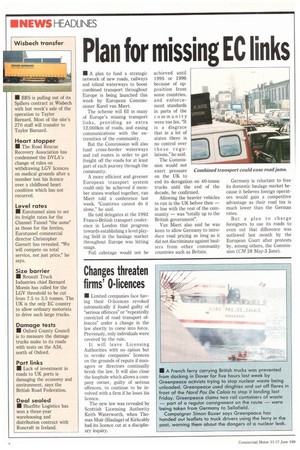Plan for missing EC links
Page 8

If you've noticed an error in this article please click here to report it so we can fix it.
/ A plan to fund a strategic network of new roads, railways and inland waterways to boost combined transport throughout Europe is being launched this week by European Commissioner Karel van Miert.
The scheme will fill in many of Europe's missing transport links, providing an extra 12,000km of roads, and easing communications with the extremities of the community.
But the Commission will also fund cross-border waterways and rail routes in order to get freight off the roads for at least part of each journey through the community.
A more efficient and greener European transport system could only be achieved if member states worked together, van Miert told a conference last week. "Countries cannot do it alone," he said.
He told delegates at the 1992 Franco-British transport conference in London that progress towards establishing a level playing field in the haulage market throughout Europe was hitting snags.
Full cabotage would not be achieved until 1995 or 1996 because of opposition from some countries, and enforcement standards in parts of the community were too lax. "It is a disgrace that in a lot of states there is no control over these regulations," he said.
The Commission would not exert pressure on the UK to end its derogation on 40-tonne trucks until the end of the decade, he confirmed.
Allowing the heavier vehicles to run in the UK before then — in line with the rest of the community — was "totally up to the British government".
Van Miert also said he was keen to allow Germany to introduce road pricing as long as it did not discriminate against hauliers from other community countries such as Britain. Germany is reluctant to free its domestic haulage market because it believes foreign operators would gain a competitive advantage as their road tax is much lower than the German rates.
But a plan to charge foreigners to use its roads to even out that difference was outlawed last month by the European Court after protests by, among others, the Commission (CM 28 May-3 June).
















































































